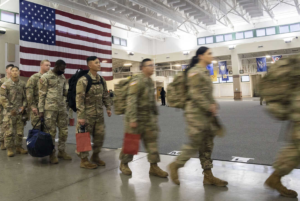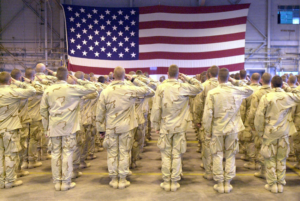The US Army is facing a significant challenge as a growing number of Gen Z recruits take to TikTok to voice their dissatisfaction with various aspects of military life. From low pay to grueling fitness tests, these soldiers’ candid posts highlight the ongoing recruitment crisis. TikTok has become an unexpected battleground for disillusioned soldiers, potentially deterring potential recruits and sparking broader concerns.

Prominent voices like Anthony Laster criticize Army life, highlighting issues such as lack of privacy and disrespectful leadership. These criticisms, often shared from deployment zones, paint a bleak picture of military service. Concerns about TikTok’s ties to China and accusations of promoting anti-US propaganda further complicate the Army’s recruitment woes.

Gen Z’s interest in military service is declining, with only 9 percent expressing interest, down 13 percent from pre-pandemic levels. Attempts to appeal to Gen Z with “woke” advertising campaigns have faced criticism. Additionally, a fitness crisis plagues the military, with 23 percent of soldiers registered as obese in 2021.

TikTok has become a platform for soldiers to share their insights and dissuade potential recruits. Videos from soldiers like Shemar Williams and Sergeant Barber highlight issues such as inadequate pay and mundane tasks. Female recruits also warned about stringent weight and fitness requirements, making military service daunting for many.
The recruitment crisis extends beyond TikTok, with over half of American 18 to 25-year-olds ineligible for enlistment due to being overweight or obese. The Department of Defense is taking steps to address the issue, including updating mobile application security policies and removing TikTok from government-funded equipment.
The TikTok mutiny underscores the challenges facing military recruitment efforts, with soldiers’ candid posts shedding light on issues ranging from low pay to a lack of autonomy. These revelations, coupled with broader concerns about health and fitness, demand attention from military leadership.
A Shift in Attitude and Expectations
The new generation of recruits entering the military has grown up in a different social and economic climate than previous cohorts. These young men and women are part of a generation that values transparency, open communication, and social equity. They are accustomed to discussing mental health openly, advocating for inclusivity, and standing up for personal well-being – attitudes that contrast sharply with the traditional stoicism and discipline culture of previous military generations.
While these recruits still deeply respect the commitment required to serve the country, they are also less willing to endure challenges silently or follow orders without questioning policies. Instead, they are speaking out about the realities of life in the military and the systemic issues that have affected them and their fellow service members. This willingness to challenge authority and speak candidly about hardships is sparking significant debates about the necessary changes that must be made to support recruits’ mental and emotional health, well-being, and career satisfaction.
Key Issues Highlighted by the New Generation
- Mental Health Challenges:
Mental health issues, such as depression, PTSD, and anxiety, are growing concerns among Army recruits. The military culture of resilience and toughness often discourages open discussions about mental health struggles. Many recruits say there is a stigma around seeking help and that mental health resources are insufficient or inaccessible. This issue highlights a need for better mental health support systems within the ranks and leadership that encourages seeking help without fear of repercussions. - Financial and Pay Disparities:
Pay and financial stability have become significant areas of concern for many new recruits. Despite dedicating long hours of service, some recruits are struggling to make ends meet. Issues such as inadequate housing allowances, lack of financial education, and rising living costs are prompting recruits to speak out about pay disparities. They argue that financial instability undermines morale and well-being, making it difficult to maintain long-term commitment and loyalty to the service. - Living Conditions and Infrastructure:
Another key issue is the condition of living facilities and infrastructure on military bases. Many recruits have raised concerns about outdated barracks, poor sanitation, and insufficient amenities. These substandard conditions not only impact daily living but also affect morale, discipline, and overall satisfaction within the ranks. A lack of investment in living facilities and infrastructure highlights a systemic neglect that requires urgent attention from military leadership and policymakers. - Leadership Accountability and Transparency:
The new generation is calling for greater accountability and transparency within the leadership structure. Instances of misconduct, poor leadership, and a lack of accountability are prompting discussions among recruits about the need for stronger oversight and reforms. Many believe that leadership accountability is essential to building a cohesive, respectful, and disciplined environment where recruits can thrive without fear of mistreatment or injustice.
Advocating for Change – Voices of the New Generation
Social media platforms and grassroots initiatives have become vital tools for recruits to share their stories and call attention to these issues. Online forums, social media groups, and interviews with news outlets allow recruits to bring these problems into the public sphere, where they gain visibility and public support. They are using these platforms to call on Congress, senior military officials, and the Department of Defense to implement reforms that address these systemic issues.
Veterans and service members who have served alongside these recruits are also speaking up in solidarity, emphasizing the need for an environment that prioritizes well-being, transparency, and respect for all members of the military.
The Call for Reform and Support
To address these issues effectively, substantial reforms are required at multiple levels of the military system. Some initiatives include:
- Increasing Mental Health Resources: Implementing more accessible mental health services and creating peer support networks to reduce stigma.
- Improving Pay and Financial Education: Offering financial literacy programs and revising pay structures to ensure recruits can maintain stable living conditions.
- Investing in Infrastructure: Allocating funds to improve barracks, facilities, and overall infrastructure to provide better living and working conditions.
- Promoting Leadership Accountability: Establishing strict policies to ensure leadership accountability, transparency, and the swift handling of misconduct.
Conclusion
The new generation of Army recruits is challenging the status quo, urging the military leadership and policymakers to reevaluate and improve critical aspects of life in service. Their courage in speaking up about mental health struggles, pay issues, living conditions, and leadership accountability brings attention to areas that have long been overlooked. By addressing these issues, the military can ensure that service members are healthier, more supported, and committed for the long term.
It’s not just about preserving the commitment of recruits but also about ensuring that they are equipped with the tools, resources, and support to serve effectively. These changes will ultimately strengthen the U.S. Army, improve overall morale, and guarantee that future generations continue to serve their nation with loyalty, purpose, and well-being. The time to listen, reform, and invest in these areas is now – because a stronger, healthier military is not only about commitment but about ensuring that those who serve are supported every step of the way.

